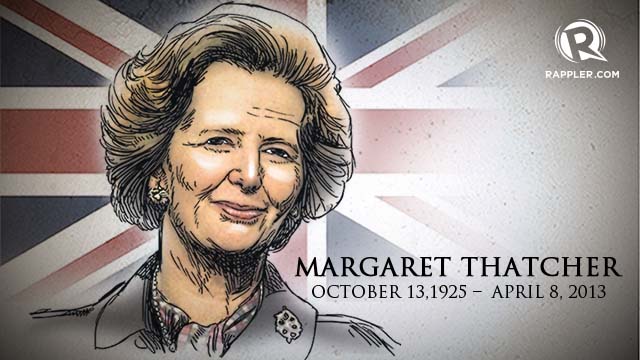SUMMARY
This is AI generated summarization, which may have errors. For context, always refer to the full article.

BUENOS AIRES, Argentina – Argentines offered bitter reflections on Margaret Thatcher on Monday, April 8, portraying the late former British prime minister as a warmonger who prolonged the Falkands War for political ends.
Several Argentine veterans of the 1982 conflict that provided Thatcher with one of her career’s defining chapters reacted with delight at news of her death from a stroke in London.
“God bless the day that that terrible woman has died,” said Domenico Gruscomagno, 71. “She was an odious person. In order to win elections in Great Britain, she waged war.”
Mario Volpe, leader of the Malvinas (Falklands) War Veterans Center, said Thatcher “died without being punished, without having been put on trial.”
Volpe accused Thatcher of ignoring an opportunity to broker a peace deal with Argentina’s military junta before her infamous decision to approve a strike on the Belgrano battleship at the height of the conflict.
“Let’s say that she will not be remembered as someone who contributed anything to peace,” said Volpe.
“I always think of her decision to sink the cruise ship (General Belgrano), because when presented with the opportunity to stop the war, she never did. She stepped it up,” he said.
Tensions between Argentina and Britain have increased in recent years against a backdrop of the discovery of oil reserves in waters off the Falklands, and the 30th anniversary of the 1982 war over the disputed South Atlantic islands.
London has held the Falklands since 1833 but Buenos Aires says this is an occupation and the British residents are colonial implants with no right to self-determination.
Argentina says the United Nations had issued 40 resolutions calling on Buenos Aires and London to negotiate over sovereignty. Britain has refused.
The sinking of the Belgrano in 1982 came as the Organization of American States had tabled a peace plan. The strike claimed the lives of 323 Argentine sailors, almost half the 649 Argentine fatalities in the 74-day war. The British toll from the conflict was 255.
For Volpe, the veteran who came home with a punctured lung and serious shoulder injury, “by deciding to continue the conflict by sinking the Belgrano (May 2, 1982), Thatcher put herself on the same level as (Argentine military dictator Leopoldo) Galtieri.”
Galtieri, seeking to drum up political support at home on a nationalist issue, decided to call the invasion on April 2, 1982. It was the same day that Carlos Diaz was born in Santiago del Estero, central Argentina.
And while most Argentines, who are taught that the islands are theirs from their first day in school, believe that is true, that does not mean they support a non-democratic goverment’s decision to go to war.
‘Cold blood’
“First, I would like to say that there should be a formal apology from our (Argentine) leaders for having sent the country to an unnecessary war, for sending kids with no training to a certain death,” Diaz said.
But “where Thatcher went wrong,” Diaz went on, “is that she knew international law is on Argentina’s side and even still actively chose to go to war against a militarily inferior nation.”
“She rose to the occasion in terms of her cold blood, … protecting the islands’ oil and its British people,” he added.
“She was an aggressive, Iron Lady,” said engineer Rene Miranda, 69. But “Galtieri waged a very unfair war as well because he sent our boys to war when they did not even know how to use a rifle, and the military higher-ups put them out front” to die. – Agence France-Presse
Add a comment
How does this make you feel?
There are no comments yet. Add your comment to start the conversation.